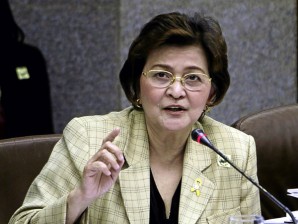Why won’t they believe her?
A plaintive Margarita Juico, chairperson of the Philippine Charity Sweepstakes Office (PCSO), on Saturday tried to extricate herself from the firestorm of criticism over an interview she gave a week ago in which she was quoted as saying that the agency had for a year now withdrawn P115 million worth of funding grants to 115 charitable organizations.
Repeated explanations and clarifications in the media seem to have fallen on deaf ears. “It’s really bothering me and I feel very sad. Some have been calling us cruel and heartless. And I’ve been receiving a lot of text messages and e-mails, particularly from nuns who run some of these institutions, asking ‘Have we abused?’ Many of these groups actually have good track records,” Juico said.
The beneficiary organizations had “misused” the funds by using it for administrative expenses instead of medicines, health care and food, she was quoted as saying in the article which appeared in the September 25 issue of the Philippine Daily Inquirer.
Juico on Saturday reiterated that no charitable institution had been “delisted” from the PCSO’s endowment program.
“Once and for all, to set the record straight, we have not delisted any organization. We are just in the process of reviewing their use of the funds,” she said in a phone interview.
But the beneficiaries still believe the worst.
Juico admitted, however, that the PCSO had “suspended” the grants to 26 of the organizations that had supposedly been delisted, because they failed to liquidate the funds they had received.
Some of the institutions had not submitted their reports dating back to 2002, she said.
Asked for the names of the 26 organizations, she referred the Inquirer to Dr. Jose Bernardo Gochoco, OIC manager of the PCSO’s special projects department.
Less than P10 million
In a phone interview, Gochoco said he and Juico had agreed not to release the names until these organizations had submitted their liquidation reports.
He said the amount of funding withdrawn from these 26 institutions involved a little less than P10 million. Gochoco could not say when the suspensions started.
Juico also corrected the figure—115 instead of 112—for the number of charitable institutions, including those run by Catholic or religious organizations, that have been receiving monthly or quarterly financial assistance from the state charity agency.
She said the agency was still in the process of reviewing the endowment program and would be meeting with all 115 of them in two weeks’ time.
Full liquidation required
Juico explained that as a government agency, the PCSO must comply with audit and accounting procedures, one of which is the requirement that previous assistance must have been fully liquidated before a succeeding grant is released.
“An organization failing to comply with this requirement is not delisted but is reminded to submit the necessary liquidation documents. This has been an existing policy even before we took over the agency,” she said.
Juico said the PCSO has consistently reiterated to its beneficiary organizations that they have to comply with this to ensure the unhampered release of financial assistance.
Reporting on how the grants have been used is part of the memorandum of agreement (MOA) that a beneficiary organization signs with the PCSO, she said.
“Since the release of grants is done in installments depending on what the MOA stipulates, each organization must submit to the PCSO an accounting of how the money was spent before another portion of the fund is released,” she said.
According to Juico, previous PCSO managements were not too keen on monitoring the liquidation reports.
“Before the former [PCSO] management was not keen on monitoring the liquidation reports but these are required under the MOA,” she said.
Against PCSO mandate
It was after the new management took over and started implementing a stricter liquidation process for beneficiaries that they learned about the misuse of grants, Juico said.
Apart from unliquidated funds, Juico said the agency also learned that some of the funds given to charitable groups were used for administrative expenses instead of going into health care or direct aid to poor recipients, contrary to what the stipulations of the grants.
“We’ve discovered that a huge portion of the grants financed the salaries of employees of charitable organizations and funded operating expenses, such as electricity and other utilities. This practice goes against the agency’s mandate to fund health and medical expenses of the poor,” she said.
Review of policies, contracts
According to Juico, as a result of a recent Senate inquiry into the alleged misuse of PCSO “intelligence funds” during the previous administration, the new PCSO management has initiated a review not just of the agency’s finances but also its policies and contracts.
The agency is now on the process of reviewing the endowment program in its entirety to assess whether people in need benefited from the funds, she said.
“We want to determine if it was better to channel the financial assistance through charitable groups, which were private in nature, or release it directly to people,” she said.
Juico said the agency was now looking at ways to make the liquidation process easier for institutions that may not have adequate accounting backgrounds.
Seminars on accounting
She said the agency was considering conducting seminars on accounting to teach the charitable groups how to “properly liquidate” the funds which should be allocated for medical purposes.
Juico said she felt she needed to reiterate a clarification on the alleged PCSO funds misuse story “because it has already affected a lot of people.”
“It’s just so frustrating because I know how people behind these organizations work. In fact, I feel at ease whenever I learn that a certain beneficiary is being run by the religious because I know they’re very committed to the poor,” Juico said.
